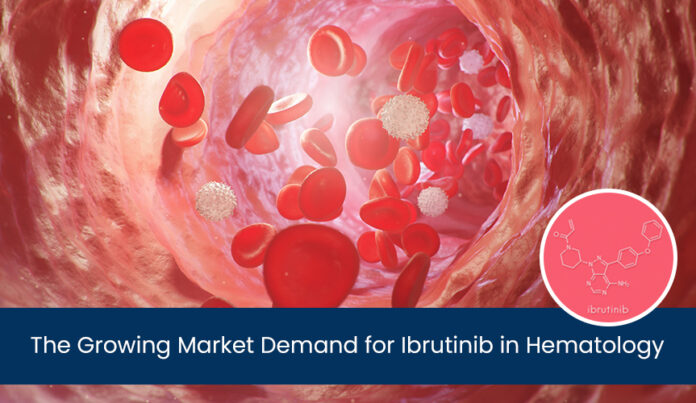In haematology, Ibrutinib has emerged as a significant breakthrough in the treatment of various blood cancers and related conditions. This oral medication, also known by its brand name Imbruvica, has shown remarkable efficacy in targeting specific molecular pathways and inhibiting the growth of cancer cells. As a result, the demand for Ibrutinib has been steadily increasing, revolutionizing the treatment landscape for haematological malignancies. Through this blog, we will explore the importance of Ibrutinib in haematology, the current market landscape, key factors driving its growing demand, as well as the market opportunities and challenges it presents.
Table of Contents
What is Ibrutinib?
Ibrutinib API belongs to a class of drugs called Bruton’s tyrosine kinase (BTK) inhibitors. It is primarily used for the treatment of conditions such as chronic lymphocytic leukaemia (CLL), mantle cell lymphoma (MCL), Waldenstrom macroglobulinemia (WM), and marginal zone lymphoma (MZL). By selectively targeting and blocking the BTK enzyme, Ibrutinib disrupts the signalling pathways that promote cancer cell survival, proliferation, and resistance to therapy.
Significance of Ibrutinib in the Field of Hematology
Ibrutinib has revolutionized the market landscape for Ibrutinib due to several key advantages it offers:
- Targeted Therapy: Ibrutinib specifically targets cancer cells while sparing healthy cells, reducing the risk of adverse effects associated with traditional chemotherapy.
- High Efficacy: Clinical studies have demonstrated significant response rates and improved survival outcomes in patients treated with Ibrutinib.
- Oral Administration: Ibrutinib is available in oral form, providing convenience to patients who can take the medication at home without the need for hospital visits.
- Extended Treatment Duration: Ibrutinib has shown durable responses, allowing patients to benefit from long-term disease control.
- Expanded Indications: Ongoing research and clinical trials are exploring the efficacy of Ibrutinib in various haematological malignancies, potentially expanding its indications in the future.
Current Market Landscape for Ibrutinib
Ibrutinib market demand sales have increased significantly in recent years. Ibrutinib-based medications are now more widely accessible and available thanks to the development and marketing efforts of numerous pharmaceutical companies. The hematology market trend is characterised by a competitive atmosphere, with numerous firms vying for dominance and market share.
Key Factors Contributing to the Growing Demand for Ibrutinib
The growing demand for Ibrutinib can be attributed to several factors:
Clinical Efficacy: Growing demand of Ibrutinib has shown considerable clinical benefits in patients with haematological malignancies, such as increased overall response rates, progression-free their survival, and overall survival.
Expanded Approvals: Ibrutinib’s approvals from regulators now cover more indications and patient groups, which helps to accelerate its use in clinical settings.
Haematological cancers are becoming more common: The incidence and prevalence of haematological cancers are rising globally, creating a larger patient population in need of effective therapy alternatives.
Advances in Personalised Medicine: Ibrutinib is a prime example of precision medicine’s effectiveness since it addresses the molecular abnormalities that are present in specific blood cancers, enabling the development of individualised treatment plans.
Ibrutinib is administered orally, which is preferred by patients and convenient for them. This eases the strain of frequent hospital visits and improves treatment compliance.
Current Market Landscape for Ibrutinib
Effectiveness Ibrutinib’s market has expanded significantly, and pharmaceutical firms are engaged in fierce competition on it. Both existing pharmaceutical behemoths and newly developing biotech companies are major players in the sector. Patients and healthcare professionals now have a variety of options to choose from thanks to the availability of several Ibrutinib-based medications, which has encouraged market growth and sparked innovation.
Market Opportunities and Challenges
The growing demand for Ibrutinib presents several market opportunities, including:
- Expansion into New Indications: Ongoing research and clinical trials are exploring the potential of Ibrutinib in treating other haematological malignancies and even solid tumours, offering opportunities for market expansion and diversification.
- Geographical Expansion: There is room for geographic expansion as Ibrutinib continues to gain regulatory approvals in different regions, allowing more patients to access this life-changing treatment.
- Patient Education and Awareness: Increasing patient education and awareness about Ibrutinib and its benefits can drive market growth by ensuring that eligible patients are aware of this treatment option and can make informed decisions.
However, the market for Ibrutinib also faces certain challenges:
- Competition from Other Targeted Therapies: The entry of new targeted therapies in the market poses a challenge to the market share of Ibrutinib. Continuous research and development efforts are essential to maintain a competitive edge.
- Pricing and Reimbursement: Pricing and reimbursement challenges can impact the accessibility of Ibrutinib for patients, especially in healthcare systems with stringent cost control measures.
Future Outlook and Potential Growth
Future outlook of Ibrutinib appears to have a huge success ahead of it, with substantial growth opportunities. Ibrutinib use is anticipated to rise across a range of haematological cancers as research advances and more information on long-term results becomes available. The creation of new medication formulations and combination therapies may help ibrutinib’s effectiveness and range of applications with market opportunities in Hematology.
Additionally, advances in genetic testing and personalised medicine may make it possible to identify particular subgroups of patients that might benefit most from Ibrutinib therapy. The treatment results could be revolutionised by this personalised method of therapy, which would also increase demand for Ibrutinib.
Conclusion
Ibrutinib’s patient-friendliness, beneficial effectiveness, and customised therapy approach, in sum, are what are causing a growing demand for it in haematology. In today’s competitive market climate, many rivals are vying for market share. The market has the potential to expand in additional indications and regions, though. Despite challenges with cost and competition, Ibrutinib has a promising future ahead of it, with potential growth sparked by advancements in tailored treatment and combo medications. Ibrutinib is poised to revolutionise the treatment landscape for haematological malignancies and improve patient outcomes as the demand for potent drugs in haematology keeps rising.
To find out more about Ibrutinib, get in touch with Bulat Pharmaceuticals!


